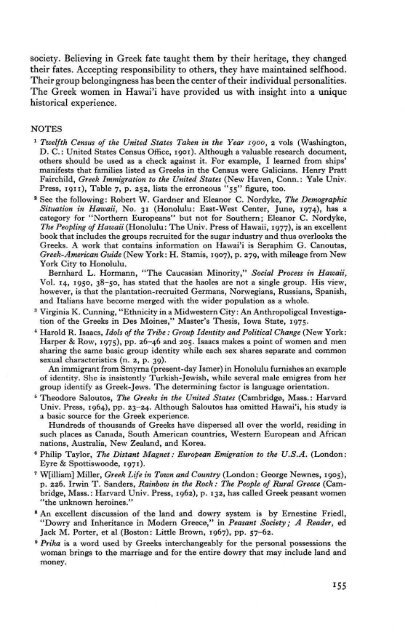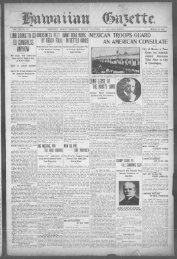From Sparta to Spencer Street: Greek Women in Hawai'i - eVols
From Sparta to Spencer Street: Greek Women in Hawai'i - eVols
From Sparta to Spencer Street: Greek Women in Hawai'i - eVols
You also want an ePaper? Increase the reach of your titles
YUMPU automatically turns print PDFs into web optimized ePapers that Google loves.
society. Believ<strong>in</strong>g <strong>in</strong> <strong>Greek</strong> fate taught them by their heritage, they changed<br />
their fates. Accept<strong>in</strong>g responsibility <strong>to</strong> others, they have ma<strong>in</strong>ta<strong>in</strong>ed selfhood.<br />
Their group belong<strong>in</strong>gness has been the center of their <strong>in</strong>dividual personalities.<br />
The <strong>Greek</strong> women <strong>in</strong> <strong>Hawai'i</strong> have provided us with <strong>in</strong>sight <strong>in</strong><strong>to</strong> a unique<br />
his<strong>to</strong>rical experience.<br />
NOTES<br />
1 Twelfth Census of the United States Taken <strong>in</strong> the Year 1900, 2 vols (Wash<strong>in</strong>g<strong>to</strong>n,<br />
D. C.: United States Census Office, 1901). Although a valuable research document,<br />
others should be used as a check aga<strong>in</strong>st it. For example, I learned from ships'<br />
manifests that families listed as <strong>Greek</strong>s <strong>in</strong> the Census were Galicians. Henry Pratt<br />
Fairchild, <strong>Greek</strong> Immigration <strong>to</strong> the United States (New Haven, Conn.: Yale Univ.<br />
Press, 1911), Table 7, p. 252, lists the erroneous "55" figure, <strong>to</strong>o.<br />
2 See the follow<strong>in</strong>g: Robert W. Gardner and Eleanor C. Nordyke, The Demographic<br />
Situation <strong>in</strong> Hawaii,, No. 31 (Honolulu: East-West Center, June, 1974), has a<br />
category for "Northern Europeans" but not for Southern; Eleanor C. Nordyke,<br />
The Peopl<strong>in</strong>g of Hawaii (Honolulu: The Univ. Press of Hawaii, 1977), is an excellent<br />
book that <strong>in</strong>cludes the groups recruited for the sugar <strong>in</strong>dustry and thus overlooks the<br />
<strong>Greek</strong>s. A work that conta<strong>in</strong>s <strong>in</strong>formation on <strong>Hawai'i</strong> is Seraphim G. Canoutas,<br />
<strong>Greek</strong>-American Guide (New York: H. Stamis, 1907), p. 279, with mileage from New<br />
York City <strong>to</strong> Honolulu.<br />
Bernhard L. Hormann, "The Caucasian M<strong>in</strong>ority," Social Process <strong>in</strong> Hawaii,<br />
Vol. 14, 1950, 38-50, has stated that the haoles are not a s<strong>in</strong>gle group. His view,<br />
however, is that the plantation-recruited Germans, Norwegians, Russians, Spanish,<br />
and Italians have become merged with the wider population as a whole.<br />
3 Virg<strong>in</strong>ia K. Cunn<strong>in</strong>g, "Ethnicity <strong>in</strong> a Midwestern City: An Anthropoligcal Investigation<br />
of the <strong>Greek</strong>s <strong>in</strong> Des Mo<strong>in</strong>es," Master's Thesis, Iowa State, 1975.<br />
4 Harold R. Isaacs, Idols of the Tribe: Group Identity and Political Change (New York:<br />
Harper & Row, 1975), pp. 26-46 and 205. Isaacs makes a po<strong>in</strong>t of women and men<br />
shar<strong>in</strong>g the same basic group identity while each sex shares separate and common<br />
sexual characteristics (n. 2, p. 39).<br />
An immigrant from Smyrna (present-day Ismer) <strong>in</strong> Honolulu furnishes an example<br />
of identity. She is <strong>in</strong>sistently Turkish-Jewish, while several male emigres from her<br />
group identify as <strong>Greek</strong>-Jews. The determ<strong>in</strong><strong>in</strong>g fac<strong>to</strong>r is language orientation.<br />
5 Theodore Salou<strong>to</strong>s, The <strong>Greek</strong>s <strong>in</strong> the United States (Cambridge, Mass.: Harvard<br />
Univ. Press, 1964), pp. 23-24. Although Salou<strong>to</strong>s has omitted <strong>Hawai'i</strong>, his study is<br />
a basic source for the <strong>Greek</strong> experience.<br />
Hundreds of thousands of <strong>Greek</strong>s have dispersed all over the world, resid<strong>in</strong>g <strong>in</strong><br />
such places as Canada, South American countries, Western European and African<br />
nations, Australia, New Zealand, and Korea.<br />
6 Philip Taylor, The Distant Magnet: European Emigration <strong>to</strong> the U.S.A. (London:<br />
Eyre & Spottiswoode, 1971).<br />
7 W[illiam] Miller, <strong>Greek</strong> Life <strong>in</strong> Town and Country (London: George Newnes, 1905),<br />
p. 226. Irw<strong>in</strong> T. Sanders, Ra<strong>in</strong>bow <strong>in</strong> the Rock: The People of Rural Greece (Cambridge,<br />
Mass.: Harvard Univ. Press, 1962), p. 132, has called <strong>Greek</strong> peasant women<br />
"the unknown hero<strong>in</strong>es."<br />
8 An excellent discussion of the land and dowry system is by Ernest<strong>in</strong>e Friedl,<br />
"Dowry and Inheritance <strong>in</strong> Modern Greece," <strong>in</strong> Peasant Society; A Reader, ed<br />
Jack M. Porter, et al (Bos<strong>to</strong>n: Little Brown, 1967), pp. 57-62.<br />
9 Prika is a word used by <strong>Greek</strong>s <strong>in</strong>terchangeably for the personal possessions the<br />
woman br<strong>in</strong>gs <strong>to</strong> the marriage and for the entire dowry that may <strong>in</strong>clude land and<br />
money.

















